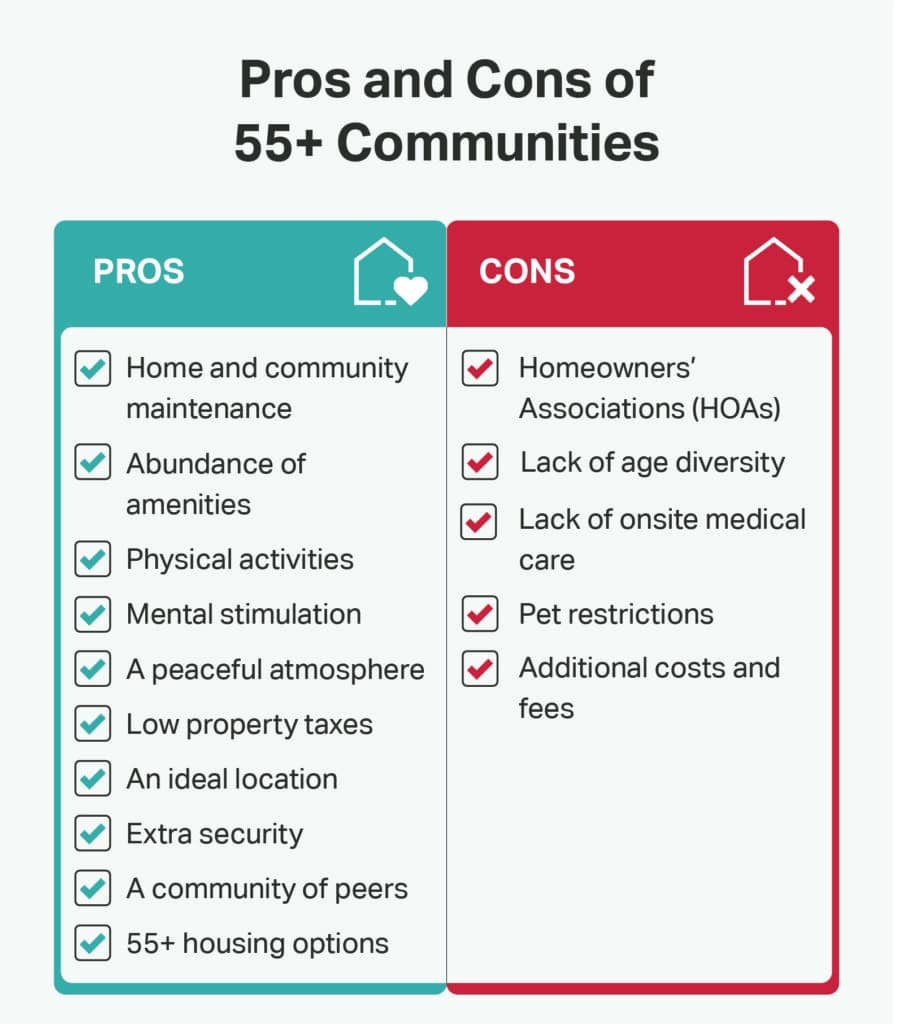It’s often said that buying a home is one of the most important decisions you’ll make in your life. It’s so much more than just four walls and a roof. You buy a home for its features but also for the neighborhood and the people who make the community live and breathe.
The importance of that decision guides much of the decision-making here at 55places.com. As the number one resource for homebuyers considering a 55+ community, we want to provide an unbiased and straightforward list of the pros and cons of living in an active adult community. So let’s dive in and explore if a 55+ community is right for you!

The Basics: What Is a 55+ Community?
At its simplest, an active adult community (often referred to as a 55+ or “over 55” community) is one with residents primarily over the age of 55. The establishment of 55+ communities dates back to the Fair Housing Act of 1968 (FHA). This act sought to prohibit discrimination in housing based on race, gender, religion, or age.
Though communities geared towards those over 55 existed before then, there was no law preventing homebuyers under that age from moving in. In 1995, title VIII of the FHA was amended, allowing 55+ communities to restrict the age of their residents and market to homebuyers specifically over the age of 55. This amendment recognized the demand for housing geared toward the needs of active adult homebuyers.
Beyond the legal definition, 55+ communities are designed with homebuyers over 55 in mind. This includes things like shared amenities, ADA-compliant facilities, and low-maintenance homes. They’re often, but not always, located in the Sunbelt to appeal to northerners looking for a reprieve from cold winters and shoveling snow.
Also, 55+ communities offer a sense of belonging and comradery to their residents. Many older adults can feel isolated during their retirement. When moving to a community with neighbors of a similar age, it’s easier to connect with people and make new friends.
Now that we’ve defined a 55+ community, let’s look at some of the ups and downs of living in an active adult community.
Pros of 55+ Communities

Home and Community Maintenance
Living in a 55+ community comes with a big advantage: the homeowners’ association (HOA) takes care of the community’s maintenance. They handle common areas, landscaping, shared amenities, and sometimes even the landscaping and exterior maintenance of your own house. You’re usually still responsible for your home’s interior and backyard. However, having the HOA manage most of your home’s exterior gives you more time for your favorite activities.
Abundance of Amenities
55+ communities offer a notable advantage with their amenities, surpassing what you usually find in traditional neighborhoods. These amenities create opportunities to engage in dynamic activities independently, with your loved ones, or with your neighbors, making it an excellent foundation for building a vibrant social life.
Common amenities include:
- Sports courts
- Golf courses
- Social events
- Dog parks
- Art studios
- Dining areas
- Classes
- Fitness centers
The term ‘active’ is key in these communities. It reflects the residents’ enthusiasm for staying engaged, making social connections, and simply having fun. These amenities are central to enhancing your overall quality of life.
Physical Activities
Do you want to go to the gym but don’t want to deal with additional monthly fees? Most 55+ communities offer access to tennis courts, pools, walking trails, pickleball courts, and even ballrooms. In many communities, you can also sign up for classes, like Yoga or Pilates.
Prefer to do your own thing? There are plenty of opportunies for that too. Many 55+ communities are located near local outdoor recreation facitlies, and some even feature expansive natural spaces onsite for you to explore at your leisure.
Mental Stimulation
Are you eager to learn new things and broaden your horizons? Many 55+ communities cater to lifelong learners by providing a variety of opportunities for mental stimulation. From well-stocked libraries and lively book clubs to engaging guest lectures and discussion groups, these communities foster intellectual growth and curiosity.
For those who enjoy hands-on learning, many communities offer workshops in arts and crafts, technology, and creative writing. You can take up a new language, refine your cooking skills, or explore photography. Additionally, some communities partner with local colleges and universities to offer continuing education courses, allowing you to dive deeper into subjects that interest you.
Whether you prefer independent study or group interaction, these opportunities ensure that your mind stays sharp, engaged, and constantly expanding.
A Peaceful Atmosphere
Do you prefer living in a calm and quiet community? Maybe you’ve had experiences with younger neighbors who enjoy loud music, late-night parties, or have active children. While diverse neighborhoods appeal to some, an active adult community is a better choice if you’re looking for a more peaceful living environment.
You can expect a serene atmosphere in these communities. Adult children and grandchildren are welcome to visit. However, there’s usually an understanding that younger visitors will be considerate of the desire for peace and quiet, making a pleasant living experience for all.
Low Property Taxes
Property taxes tend to be lower in active adult communities, especially the larger ones. With fewer children, less money is needed to support schools, after-school programs, and other government services aimed at young people. Residents of 55+ communities tend to be more civically active and often work hard to ensure government expenditures are kept in check.
An Ideal Location
“Location, location, location” is the age-old maxim in the world of real estate, and it’s absolutely relevant when it comes to 55+ communities. Though these communities can be found in all 50 states, the greatest concentration is in the Sun Belt, enticing homebuyers with year-round pleasant weather. Beyond this, over 55 communities are often located near medical facilities, helping homeowners keep a continuum of care even when moving across the country.
If you dream of moving to another state, you can find a 55+ community there. 55places can help you explore all of your options. Head to our homepage and just click on a state to look at the active adult communities located there.
Extra Security
One of the top reasons many people choose a 55+ community is the added sense of security and peace of mind it provides. Many of these communities are located within gated neighborhoods, ensuring that only residents and approved guests have access. This controlled entry helps reduce outside traffic, creating a safer and more private living environment.
Beyond gated access, many 55+ communities also offer onsite security personnel who patrol the area regularly. Some even have 24/7 security teams available to respond to any concerns, whether it’s an unexpected visitor, a suspicious situation, or an emergency.
A Community of Peers
The active adult lifestyle holds great appeal for those who relish the company of peers in the same age group. In active adult communities, your neighbors are in the same life stage and share similar interests. This provides a sense of comfort and interest from the diverse experiences they bring.
With similar schedules, you can easily sync up with your neighbors. On weekdays, you can explore less crowded places without worrying about work or the need for babysitters. At this stage of life, you can fully embrace relaxation, take your time, and enjoy an easy pace.
55+ Housing Options
Are you eager to downsize? Many 55+ communities offer condominiums, townhouses, and attached homes. Or if you’re looking forward to having a larger home, most communities offer a combination of housing types so you can choose what you like.
Additionally, homes in 55+ communities are thoughtfully designed to enhance comfort, convenience, and accessibility. Many feature single-level layouts or main-floor living to eliminate the need for stairs, along with wider doorways, step-free entrances, and walk-in showers for ease of mobility. Open floor plans with ample natural lighting create a welcoming atmosphere, while modern kitchens, energy-efficient appliances, and smart home technology add both functionality and efficiency. These features help ensure a safe, stylish, and hassle-free living experience tailored to the needs of active adults.
Cons of 55+ Communities

Homeowner Associations (HOAs)
Many 55+ communities have HOAs. This can be good or bad, depending on the particular HOA. The good news is that they can help prevent yards from becoming cluttered up, so you don’t have to take care of all the maintenance yourself.
On the other hand, some HOAs prevent you from expressing yourself. From deciding what you can have on the lawn to decorations for holidays, they can decide what you can and can’t do. It can be frustrating if you have a HOA that’s stricter than you’d like.
Lack of Age Diversity
While some people enjoy living in a 55+ community without reservation, others can be put off by the lack of age diversity. If you’re someone who would like to spend your retirement working with youth, whether as a mentor or through activities like sports and scouting, you may find you have to leave your community to share your skills and knowledge.
Lack of Onsite Medical Care
As we get older, our medical needs almost always become more involved. A common misconception of 55+ communities is that they’re retirement centers. Though some do offer continuing care services, this is fairly rare. Most active adult communities are designed with independent living in mind. If you require in-home care or other frequent assistance, you may be better served by a community built around those medical needs.
Pet Restrictions
Many 55+ communities are very open to pets and even have dog parks and trails your four-legged friend will be eager to explore. This isn’t the case for all communities, however. Believe it or not, there are some people who don’t like pets and prefer to live in a community without them. A few quick questions will help you weed out the communities where you can enjoy time with your dog.
Additional Costs and Fees
The cost of living in a 55+ community can vary widely, and some can be quite expensive. If you’re on a fixed income, it’s essential to carefully evaluate whether a particular community fits within your budget. Before purchasing a home, consider asking key financial questions to avoid unexpected expenses and ensure long-term affordability.
- What is the price range of homes in the community?
- Are there monthly HOA fees or other recurring costs?
- What is the overall cost of living in the city or town?
- What are the closing costs and additional transactional fees?
Taking the time to research these expenses will help you make an informed decision and ensure that your new home aligns with your financial goals.
Tips for Choosing an Active Adult Community

Prioritize Location
Decide whether you want to stay in a familiar neighborhood or explore a new city. Consider if you’re ready for a change in climate or scenery that suits your tastes. If travel and having visitors are important, think about the distance to the nearest airport, especially if you’re moving to a different region. Once you’ve identified your ideal location, you can start your search for active adult communities in that specific area.
Consider Your Lifestyle Needs
Consider whether you truly need amenities like a golf course if you’ve never played golf or if a smaller floor plan would suit you better. While a stylish apartment is nice, the lifestyle matters most. Take the time to explore whether the communities you’re interested in align with your lifestyle goals beyond surface-level features like new appliances.
Talk to Residents
Get to know the residents by spending time in the community. If you feel that a community is hesitant to let you connect with its residents, take it as a sign that it may not fit you. Community events offer a great opportunity to gauge the atmosphere and meet current residents. Inquire about any events you could attend to learn more about the community.
Read the Community Guidelines
Familiarize yourself with the community guidelines. It’s important to read these rules thoroughly to make sure your potential new home suits your desired lifestyle. In 55+ active adult communities, these guidelines help maintain a pleasant living environment for all residents and set standards for amenities and maintenance. Ask for a copy of the bylaws or rules that might affect your lifestyle choices.
Know Your Budget
Ask about the contents of the monthly fees and any possible extra expenses. Be aware that more amenities often lead to higher fees. Besides rent or mortgage payments, don’t forget to include HOA or community fees, which usually amount to a few hundred dollars monthly. Ensure you have a clear understanding of what these fees cover.
Visit Multiple Communities
Visit different communities and compare their residences, amenities, programs, classes, and overall culture. Assess whether you believe you’ll fit in, feel comfortable, and have ample activities to engage in.
Is a 55+ Community Really for Me?
If you’re looking to maintain an active lifestyle without needing daily assistance, an active adult community might be the ideal choice for you. Notably, residents in these communities aren’t obligated to exercise or participate in group activities. So, if your idea of relaxation includes sitting by the pool, an active adult community can still be a suitable option. Discussing your lifestyle preferences with a 55places Partner Agent can help you determine if the 55+ lifestyle is the right fit for you and can also assist in your home search.
At 55places, we’re here to assist you in finding your next perfect home. We are a trusted online resource dedicated to helping you discover what comes next in your life. We understand your unique needs and are committed to serving as advocates to guide you toward the best decision. Whether you’re interested in a low-maintenance single-level residence, an active lifestyle or age-qualified community, a cozy enclave, or anything in between, we’re here to make your next move the best one yet. To learn more information, contact us today.







